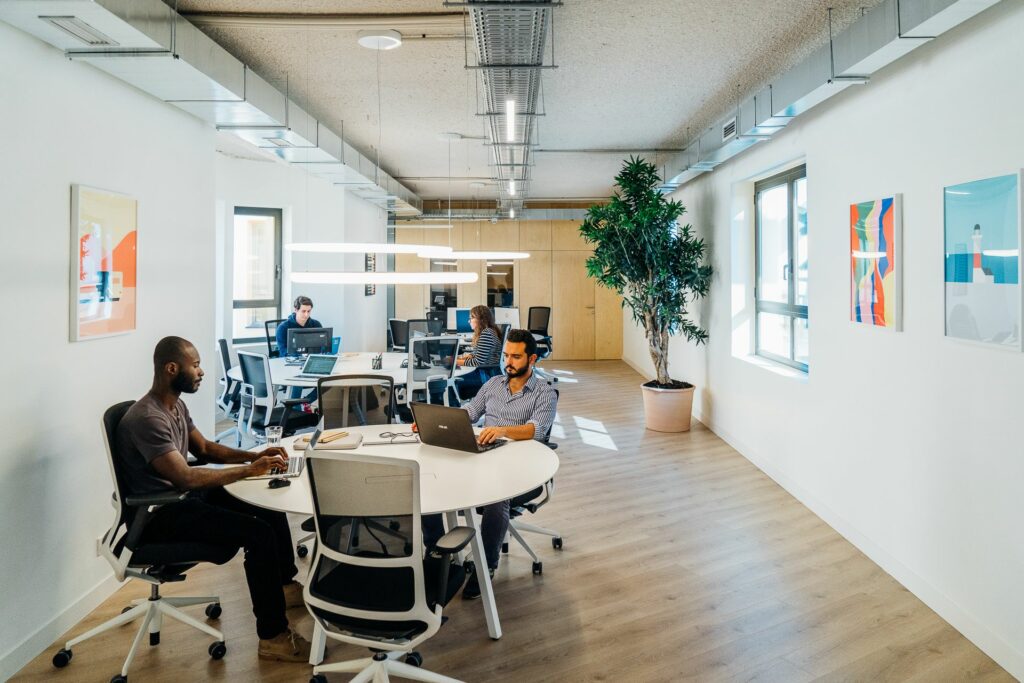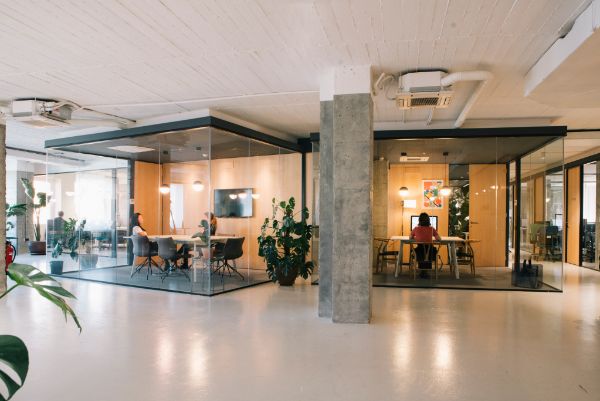During the lockdown, we organised the Ouilearn #13 webinar for Ouishare. The title of this webinar was: Is the present of work flexible? And what about the future? We wanted to discuss how will the workspaces be and what flexible strategies will take organisations after the Covid-19 crisis.
To address the issue, we invited four experts from different sectors: Rubén Carreño, Head of Advisory Services in CBRE; Sergi Tarragona, founder and CEO of Cloudworks; Josep Valls, FM Director at Suez Spain and; Mireia de las Heras, Teacher of the IESE Business School and Director at IFREI (International Center of Work and Family). As moderators of this panel were Mohammed El Youssofi of Ouishare and Vanessa Sans.
The forced remote work explosion
The last three months, as many media mentioned, we have experienced the major experiment of remote working in history. The Covid-19 crisis has changed the way we work, forcing many people to work from home. Just like Albert Cañigueral explains in his article “How Covid-19 pushes us to the future of work“:
People already working remote warns that the remote work isn’t such an easy plug & play as we would like:
- Beyond the tools, the most important is the remote work culture.
- Technology is key.
- Have you got a comfortable place to work at home and the necessary tranquillity?
Mireia de las Heras about this commented that remote work during the coronavirus time could not be called as such: it has nothing to see with the idyllic remote work that we wished, this is remote work in crisis mode. In any case, it is an excellent experiment to demonstrate that can be a feasible measure to face a new crisis if it is done in better conditions, bringing positive benefits for both parts, companies and employees.
Transformation of the workplace and delocalisation of the employees
Without a doubt, back to the new normal will force workplaces to experiment a transformation with a significant impact on the design, the capacity, the usability and healthiness to provide secure and resilient work environments.
According to Rubén Carreño, technology will help to come back to the workplaces. On one side, the use of digital and collaborative tools allows business continuity. On the other side, the use of contactless devices such as electronic access, automatic door opening or infrared sensor gel dispenser, provides security in the work environment.
Sergi Tarragona suggested that in front of any prevention measure or security protocol against Covid-19, the most important is to generate employees or users trust. The workplace manager has to educate users about how to act in this new situation. Cloudworks, for example, has organised webinars and online workshops to communicate its members the new protocol to follow-up and explained how members have to act in this unique situation.
Another relevant measure said Josep Valls, is the disinfection of the spaces. It will be a series of actions to stay as standards, consequently cleaning companies will benefit turning into disinfection companies, adding technology and innovation on their processes.
The impact is the reduction of the occupancy capacity of workplaces to guarantee employees distance. We will have to re-design the space layout according to the new occupancy capacity, either by working shifts, distributing team to different subsidiary companies, coworking spaces or employees houses. This measure definitely will change the way we work, said Josep.
As a consequence, companies to be ready to face a similar situation, are going to take strategies that promote remote work and distributed teams.
According to Rubén, we are going to start working more delocalised, and this fact will affect other sectors such as retail and restaurant services as well.
Josep explained that Suez 5 years ago was a pioneer implementing flexible work strategies within the facility of its head office in Barcelona (La Ciutat de l’Aigua) as well as the workforce. They extended it to the other subsidiaries until now. Due to the crisis, Suez is taking a step forward the smart work, enhancing remote work and collaborative workspaces like coworkings.
Conforming to Sergi, coworking spaces or flex offices are going to play an essential roll in delocalisation of employees as one of the benefits they offer is short commuting from workers home to the office.

Coworking as a vehicle of delocalisation
Forbes magazine, past January published that in 3 years the 35% of corporates will use flexible real estate. Larger organisations view flexible offices as a way to mitigate risk in an era marked by shortened business cycles and the need to stay nimble in uncertain times (like this one).
Sergi confirmed that the coworking and flexible office sector is here to stay. Property owners will operate more buildings to be near the final user, being able to offer a more flexible service and, take a significant portion of the cake. Whereas the traditional and independent coworking which the primary customer are freelancers and small companies are those most affected in the sector due to their flexible contracts. If they overcome the crisis, they will grow in the suburbs and adapting their offering to companies with long term contracts.
Rubén explained that before the lockdown, companies looked for coworking because of their service flexibility and premium locations like business areas or town centre. Right now Covid is raising an issue about having the office in town. Maybe it is better to be in a residential area to minimise distance.
Furthermore, continued explaining Rubén, he estimates a change in the way companies contract and use this kind of spaces. A company will not occupy a whole floor to keep employees together but will contract the coworking service according to employees characteristics, distributing workers in different coworking spaces.
Main factors for an organisation to effectively implement remote work
Josep summarised the main factors that an organisation has to integrate to transform into a flexible organisation:
- Digitalisation in work processes: Eliminate paper and everything that needs physical space, be able to use and share all information in digital from everywhere.
- Technology: Be equipped with portable devices and technological tools to work collaboratively with the team members.
- Physical space as a meeting point: The office is becoming a place for collaboration.
- Company culture: Cultural shift has to happen within the company to integrate a model based on employee trust and results-oriented instead of hours-worked.
What we have learned from this pandemic is not to depend on physical presence to carry out team tasks and to look for collaborative strategies and tools. A good example is Zoom that it has gone from 10 million users to 200.000 in two months. Companies need a time of transition; those who didn’t implement until now, have suffered much more.
The legislative problem of the remote work
In all processes of change, we have to take into account the disadvantages. In this case, we have to question how we are going to manage flexibility and security in this kind of work environment.
Mireia highlighted that in fact, the labour law had been the break on the flexibility of the work process because it doesn’t fit the reality. We talk about employment contracts, accidents during mobility or trying to integrate nursery services for employees in the office.
The law will have to be studied to adapt to the new way of work. Such a challenge because if the flexible work is here to stay, it will have to tackle well and provide a solution to the new reality, companies and people.
How we envision the future of work in 5 years
We all agreed with an optimistic and virtual future of work where the office will add less value; the value will be in the community, either from a company or a coworking space. The office will turn to a meeting point to share and exchange knowledge. And technology will help to generate a community that goes beyond the physical space through virtual meetings, afterworks or webinars, virtual spaces much more advanced than current and real-like ones.
Flexibility will step changing the way we live, the way we conceive spaces and the way we make relations. Physical meetings will be related to celebration events or; going to town will be linked to social encounters, not to going to work. If we work more distributed, other activities of our day a day, such as retail or restaurant businesses, will be delocalised as well (as mentioned before). Besides, coworking will grow in shapes that we don’t know yet or aren’t familiar, for example, coworking in gyms or malls.
In conclusion, remote work works when conditions are adequate, we have to find a balance between the physical and the virtual. If we don’t work at the office, then we have to consider what are the elements to replicate in a virtual environment, having into account that the community is going to be more relevant.
Part of the companies in the glove will have to thank the lockdown for boosting business towards digitalisation, flexibility and remote work. At least what we have learned will remain in the new company culture.
Watch the whole Ouilearn #13 webinar below (V.O Spanish)
Images by courtesy of Cloudworks.
The article was written by Vanessa Sans, consultant and specialist of coworking spaces and collaborative work environments.
